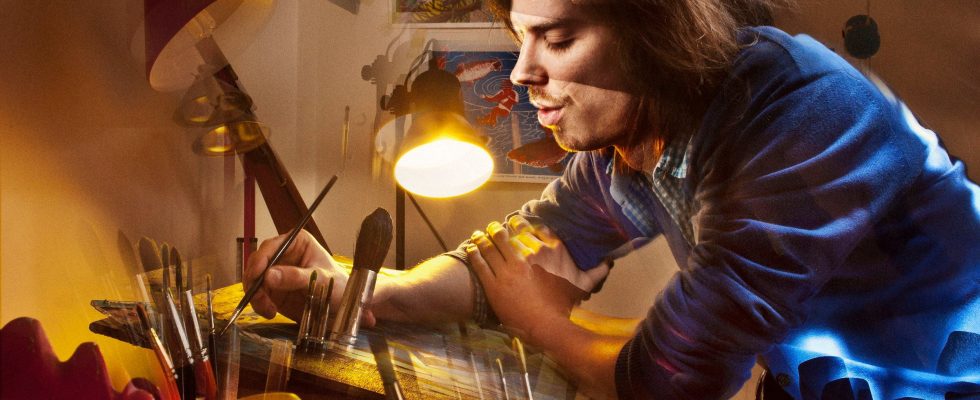Brecht Evens is not 40 years old, but he has everything else, talent bordering on genius, success bordering on modesty, recognition from his peers defying all jealousy, and above all he has just published a King Medusa which floats languidly above the bloated production generated by the confinements of the Covid years.
He was born in Belgium, speaks French very well, with an accent and some difficulties which prevent him from going beyond banalities about this work, his, which is that of all possibilities. Inaccessible to the lazy and the industrious, the drawing of Brecht Evens is never calm, constantly challenged by colors and furious characters. It creates a fight, like a language that would only serve one story, that of its hero, caught in the fetal leap. “Before, I was weak”, he writes under Arthur’s ultrasound, in the third month of a creation which blurs as much the notion of autobiography as that of graphic novel, itself contestation of the rigid principles of the comic book album.
The work is dedicated to “my fully present father.” That’s the story. A sprawling father, with toxic paranoia, infinite love, and the natural resistance of the son. I say natural because devoid of revolt, and that is one of the most admirable things, for me. It’s never “abundant”, never “delirious”, it always tells the story, all the time, and always in a precise way, whether it’s when Arthur gets the wrong dad, and the fury that then takes him away: “Hey! Control your child!”or when his father plays dead, and farts: “What? A little gas escaping… It’s normal for a corpse!”
The words wander in the image, the dream in reality
We will learn, even before asking the question, why the mother is absent. The plot awaits you at the corners of the walls, hoo! by surprise and to scare. It’s an initiatory thriller. Also. Among others. The relentless father raises his son to many things, he calls him Puer Universalis, the child who knows everything, that’s the objective, transmits to him all the knowledge in view of the big thing to come. He educates him by preparing him for a long journey, warns him of the dangers, the city, the people, to be wary, he teaches him to live, to survive, to defend himself, and soon to fight, to break through a safe. strong, feeding on insects, he teaches him the art of suffering until he bleeds (I was looking for the opportunity to make this play on words, there you go, it’s done). More seriously, because the matter is serious: we are witnessing the birth of a conspiracy, the rise of a delusional schizophrenia, on the edge of tale and experience, it is no coincidence that the words wander into the image , the dream in reality, like watercolor dissolves in the thickness of paper.
The anxiety increases, we begin to understand why Brecht Evens draws Arthur’s father without a face, in a superhero or nuclear power plant employee suit, this invisible man is a secret agent. A spy of his own neurosis. He is “in contact with a secret and powerful organization” which sends him messages and soon orders for the final uprising.
When you have this talent, you can do anything, and Brecht Evens goes far even in promoting his work. It puts an end to the outdated principle of the ridiculous and humiliating little video in which, unwillingly, pushed by the established obligation of the old-fashioned press service, the author, facing the camera, questioned by a nobody, enlightened by a cad, reveals, under this media torture, the manufacturing secrets of his book. It’s the shame of writers, my nightmare anyway.
Well type “king jellyfish” into the search bar of your browser: you will come across three vertical videos which will give you better than me, more than me, differently, like Bretch Evens himself, what is his book: an anti-Little Prince, an educated Arthur who would ask the author-aviator “Draw me an infanticide”.
.
